 This time last year, Marvel’s X-Men were mired in perhaps the most insipid event in their entire forty year history: Avengers vs. X-Men. Its name provides pretty much all of the plot: X-Men fought Avengers, because we “demanded it”. Along the way, some inane nonsense transpired, Cyclops cured world hunger, the Avengers stopped him, and Professor Xavier died for the sixth time.
This time last year, Marvel’s X-Men were mired in perhaps the most insipid event in their entire forty year history: Avengers vs. X-Men. Its name provides pretty much all of the plot: X-Men fought Avengers, because we “demanded it”. Along the way, some inane nonsense transpired, Cyclops cured world hunger, the Avengers stopped him, and Professor Xavier died for the sixth time.
In AvX’s wake, Marvel revamped the X-Men lineup, relaunching every book except for Jason Aaron’s Wolverine and the X-Men, Marjorie Liu’s Astonishing X-Men, and Peter David’s X-Factor. They brought in a series of new writers—the one you’d know being Mr. Avenger Brian Michael Bendis, along with Brian Wood and some other lesser known gentlemen—and rejiggered the whole franchise.
This fall, Marvel’s launching their first major X-Men only event since 2011’s Schism in Battle of the Atom, a venture between Aaron, Bendis, and Wood, focusing on Bendis’ insane time-displaced original X-Men being targeted by the X-Men of the future. That sounds pretty rad. What’s less interesting is what the X-Men have been doing in the year in the meanwhile. In short: most of the new books lack soul.
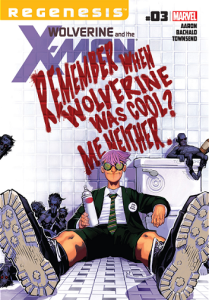 Let’s back up. The X-Men, over their forty year history, have never actually been rebooted. When you open up the newest issue of Bendis’ Uncanny X-Men, you’re feeling the weight of forty years of history. The best writers balance this history with modernity. Matt Fraction, on Uncanny a few years ago, told stories that felt like the X-Men but featured Welsh mutant Pixie and pop star Dazzler as two main team members. Rick Remender, on Uncanny X-Force last year, took the core concepts of the team, removed a major limitation—X-Force killed people, unlike the X-Men—and told great stories about the world these characters live in.
Let’s back up. The X-Men, over their forty year history, have never actually been rebooted. When you open up the newest issue of Bendis’ Uncanny X-Men, you’re feeling the weight of forty years of history. The best writers balance this history with modernity. Matt Fraction, on Uncanny a few years ago, told stories that felt like the X-Men but featured Welsh mutant Pixie and pop star Dazzler as two main team members. Rick Remender, on Uncanny X-Force last year, took the core concepts of the team, removed a major limitation—X-Force killed people, unlike the X-Men—and told great stories about the world these characters live in.
The best X-book, by far, running at the moment is Jason Aaron’s Wolverine and the X-Men, precisely because he gets this. He took the central premise of the series—young mutants in a school for them—and writes a madcap action-comedy about the faculty members, the characters the readers know, and then the students, particularly Idie Okonkwo and Quentin Quire, two of the best characters to come around in the last decade. His stories don’t demand a knowledge of the past, but they reward it: the thousands of tiny Nightcrawler-esque beings with fondness for whiskey darting around the campus, villains from the strangest recesses of the X-Men’s past, and a mixture of the famous (Wolverine, Iceman, Kitty Pryde) and the obscure (Rachel Grey, Doop, Toad, Husk) in the cast.
On the other hand, we have Bendis’ All-New X-Men and Uncanny X-Men, which feel like reductive fanservice and not an X-Book, respectively. All-New X-Men focuses on Kitty Pryde’s squad of time-displaced original X-Men (minus the original Angel, who defected to being a background character in Uncanny), which is not only the most ridiculous plot twist in a series known for them but also isn’t fun. The original X-Men are interesting characters, but they’re being used primarily as nostalgia baits instead of as individuals who will certainly live to see the end of Children of the Atom. Their appearances are more, “Let’s watch Beast and Jean Grey make out!” rather than, “Let’s look at these characters from Marvel’s Sixties in the modern day!”
Uncanny X-Men, meanwhile, doesn’t feel like an X-Book. Its core cast—Cyclops, Magik, Magneto, Emma Frost, and a bunch of kids—doesn’t feel like an X-Men team. Three quarters of the cast are reformed villains, the kids haven’t gotten anywhere beyond having cool powers (though I really like their cool powers, “Guy Who Projects Golden Balls From His Body” man excluded), and Cyclops is much less compelling as Che Guevara than he was as Fidel Castro. He’s not cool. He’s never been cool. Moreover, it just doesn’t feel like an X-Men book. There’s no drama. For an on the run band of superheroes, they’re never in real danger, thanks to some ludicrously overpowered members (Magik, who can teleport anywhere, and Tempus, who can freeze time indefinitely in a space).
Now, I like Brian Michael Bendis, writer of these two books. He’s done some good books in the past: Powers was great, and he did good work with Spider Man and the Avengers over the years. But his Eisner award winning days seem to be behind him, and he doesn’t seem thrilled to be working on the X-Men.
Meanwhile, the side books are mediocre. Astonishing X-Men and X-Factor are long-running, quality series, but they’re both being canned. Cable and X-Force and Uncanny X-Force, written by Dennis Hopeless and Sam Humphries, respectively, have their moments, especially Cable, but feel flat. I don’t read X-Men Legacy, which focuses on Professor Xavier’s insane son Legion, but I’ve not heard anything interesting about it.
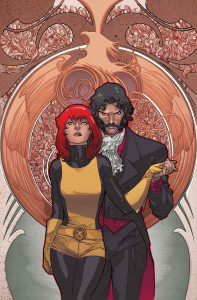 Really, the only other standout on the docket is Brian Wood’s X-Men, which attracted attention because of its all-female cast, and which has won brownie points from me by featuring so many 2000’s era X-Kids and reviving one of my favorite obscure X-Men (Karima Shapandar, or Omega Sentinel, who starred in Mike Carey’s long-running Legacy book). Wood’s take is solid, and it feels like an X-Men book, if not a particularly thrilling one.
Really, the only other standout on the docket is Brian Wood’s X-Men, which attracted attention because of its all-female cast, and which has won brownie points from me by featuring so many 2000’s era X-Kids and reviving one of my favorite obscure X-Men (Karima Shapandar, or Omega Sentinel, who starred in Mike Carey’s long-running Legacy book). Wood’s take is solid, and it feels like an X-Men book, if not a particularly thrilling one.
There’s one constant between all these books: they’ve all tried to co-opt that Avengers mojo. Modern X-books are trying, more than ever, to be clever and witty. While there’s room for that in the franchise, that’s not what the X-Men lend themselves to. Wolverine is a teenager’s idol, not a snarky Robert Downey Jr. type. He’s all emotion, all rage. That’s the X-Men as a whole. The Avengers are an idea, a collection of individuals who fight because they can save the world. The X-Men are a family, with all of the emotional turmoil that implies.
Modern X-Books—Aaron’s title excluded—have taken on that Avenger’s sterileness. Bendis writes the X-Men as superheroes, who jet around the world fighting crimes, even though his own premises don’t back that up. Cyclops is a revolutionary who doesn’t act like one; the original X-Men are scared teenagers in training who actually fight whatever incarnation of Mystique has been cast as the villain this week (seriously, she’s the villain in two books with two different motivations).
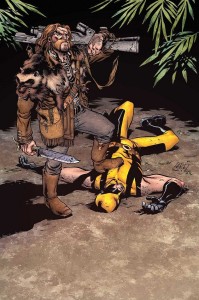 Maybe there are too many books, or maybe there are too many similar books. Sprawling collections of X-Books have coexisted before, but they focused on different corners of the universe. Modern day books tend to feature significant character overlap: Storm’s a major player in a lot of books, but never really matters, you know? In Uncanny X-Force, she’s a collection of powers. Too many characters fall into that role. They’re in lots of books because they’re popular, but like 1990’s Wolverine we know nothing’s going to happen to them. They’re completely safe. It ruins the suspension of disbelief.
Maybe there are too many books, or maybe there are too many similar books. Sprawling collections of X-Books have coexisted before, but they focused on different corners of the universe. Modern day books tend to feature significant character overlap: Storm’s a major player in a lot of books, but never really matters, you know? In Uncanny X-Force, she’s a collection of powers. Too many characters fall into that role. They’re in lots of books because they’re popular, but like 1990’s Wolverine we know nothing’s going to happen to them. They’re completely safe. It ruins the suspension of disbelief.
It’s tough. The change back to West Chester from San Francisco hasn’t been particularly smooth for Marvel’s mutants. San Francisco gave the team their own identity, a uniqueness in a world with too many superheroes. By moving back to their original homes, rather than mining nostalgia it’s rather that they seem to be out of ideas. That’s what happens when you write the same core cast for forty or thirty years: they begin to get a little boring. The most interesting fringes of the modern continuity are the characters who haven’t been in everything already: Uncanny’s X-Force’s Fantomex and Puck, adjectiveless’ moments with Jubilee, Wolverine’s kids (honestly, even Aaron’s Wolverine, who’s delightfully out of his depth), and Cable’s side cast, most of whom have been neglected since the 90’s. And Colossus, who’s another character who really benefited from the status quo shift turning him into a man on the run.
There’s still good material here, in the X-Universe, but it’s stretched oh-so-thin and wasted in half the flagship books. I’m hopeful that Battle of the Atom will rejigger things, though, and maybe push the main books into different, more interesting directions. Maybe it’ll get rid of the ill-thought out time-displaced X-Men, which would be saving grace enough.
Tom is an aspiring author, editor, and games critic. He has written for such esteemed places as Pixels or Death and Nightmare Mode, as well as other outlets. He dreams of owning a moon base and getting positive reactions from readers.




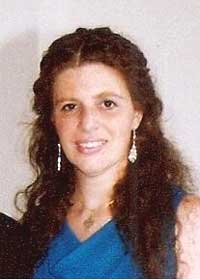
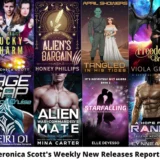




Recent Comments